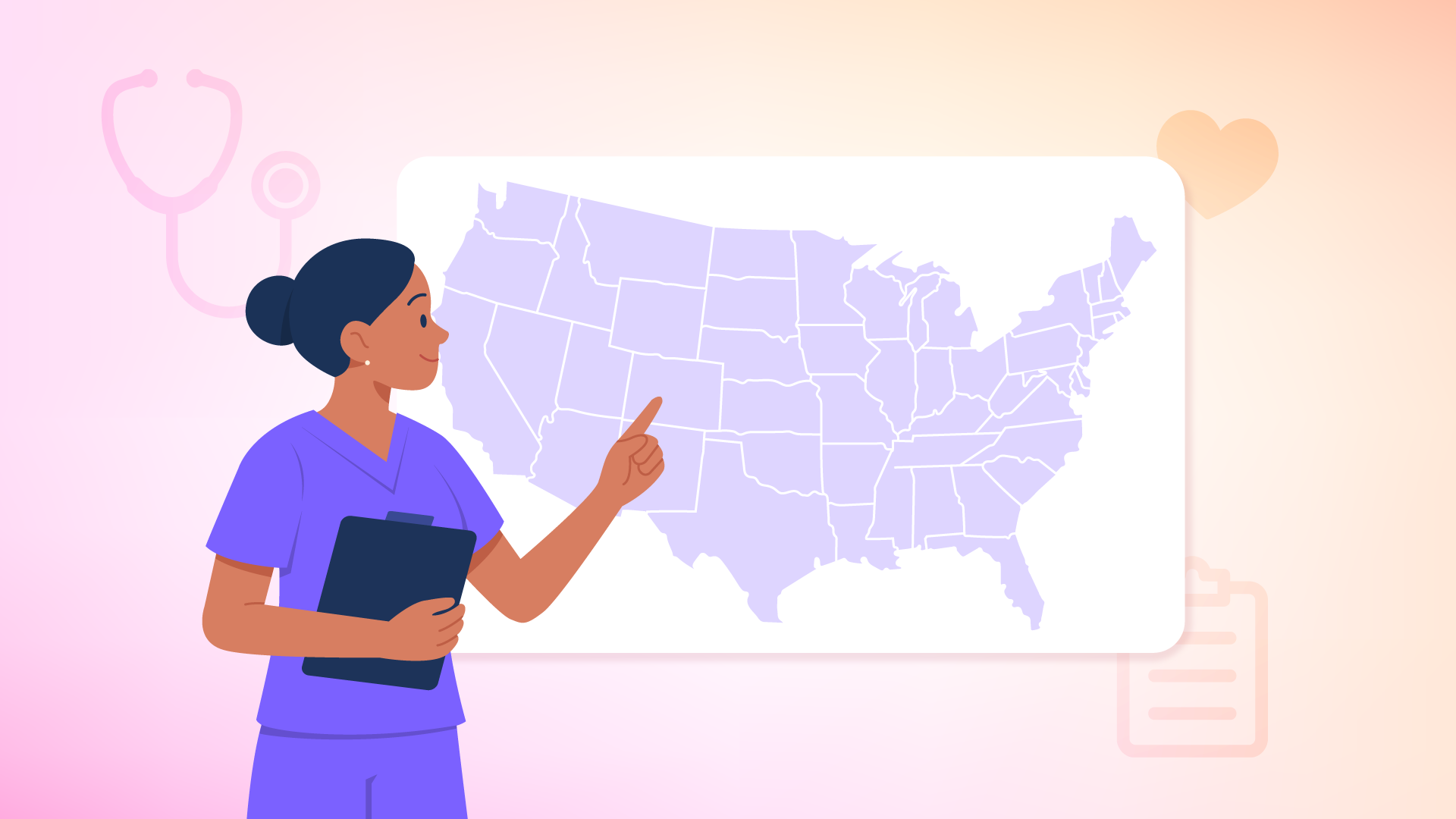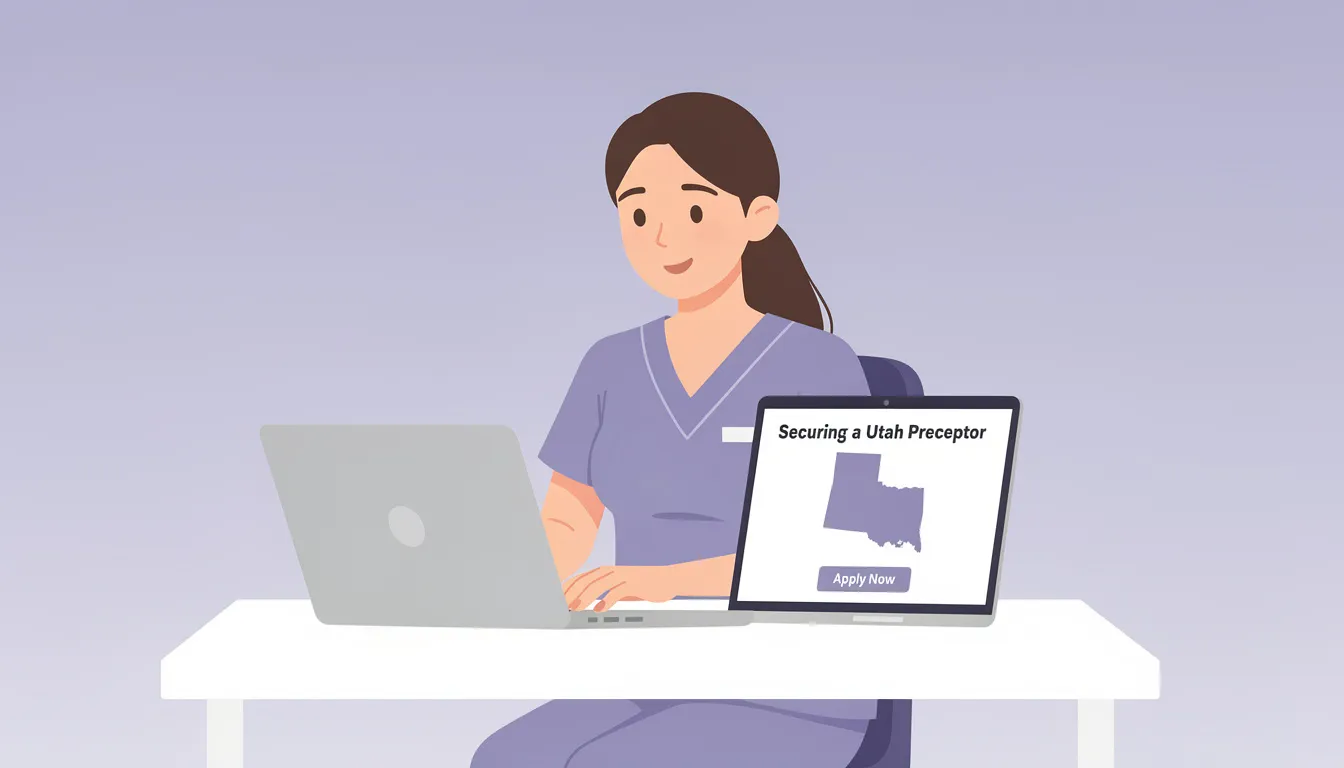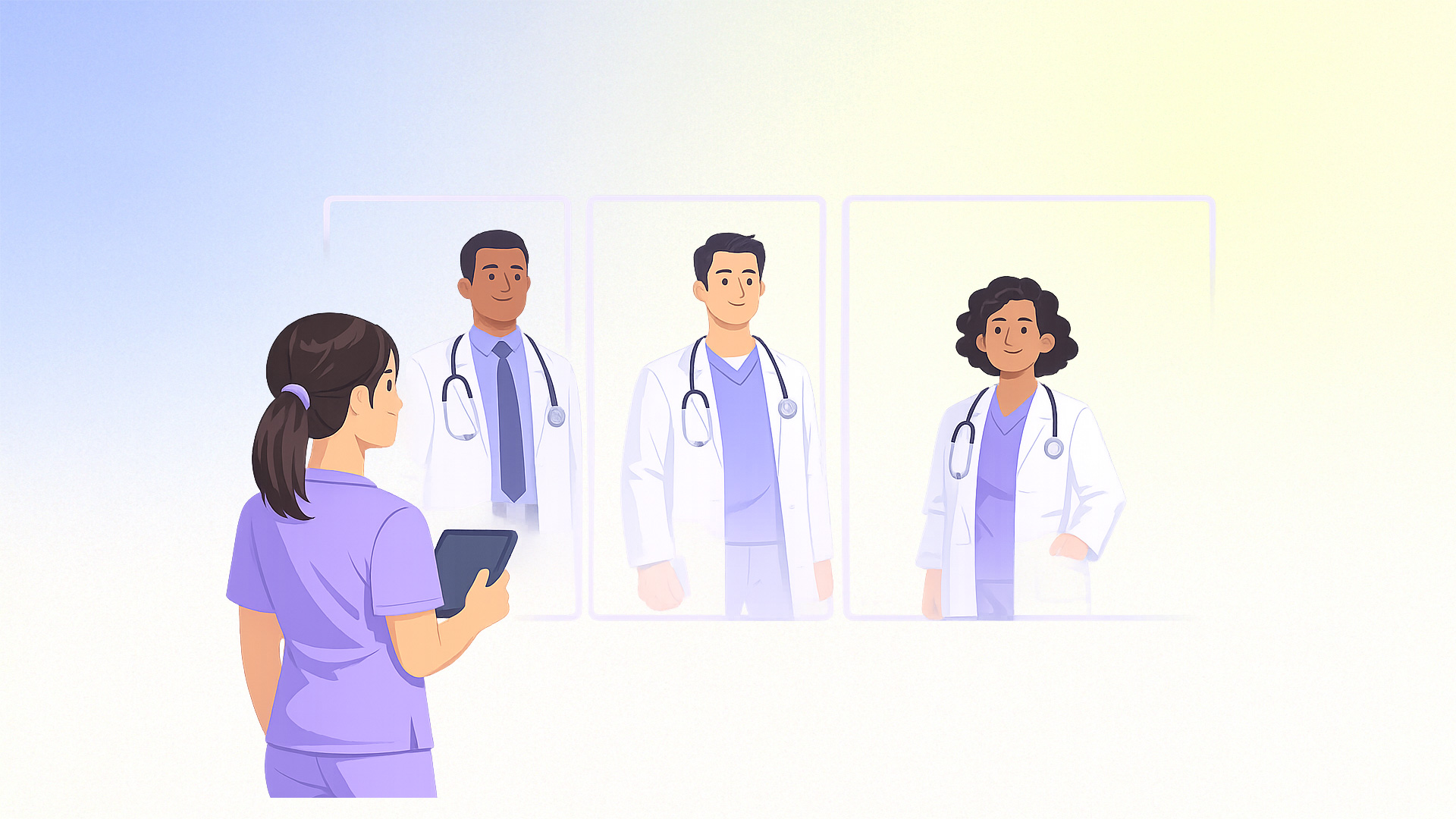Purdue Global University's academic program requires nurse practitioner students to complete supervised, in-person clinical rotations across primary care, mental health, and acute care settings. These placements are essential for graduation and national certification, allowing students to apply advanced coursework like advanced health assessment, health assessment, and diagnostic reasoning in real healthcare environments.
TL;DR – Purdue Global University Clinical Rotations
- Clinical placements are a collaborative process. Purdue Global supports students with guidance, requirements, and academic oversight throughout the clinical experience.
- Clinical hour requirements vary by specialty. Staying organized with required documentation helps ensure a smooth progression toward graduation.
- Like many NP programs nationwide, coordinating clinical placements can be a detailed process, but with planning and the right resources, students move forward successfully every term.
- NP students can also choose NPHub as an additional support option to connect with vetted preceptors and stay on track for graduation and certification.
Disclaimer: NPHub is an independent, private service that helps students find vetted preceptors, handle documentation, and stay on track for graduation and licensure. NPHub is not affiliated with or endorsed by Purdue Global University. This article is intended to share general, informational guidance based on our experience helping NP students from hundreds of NP programs secure clinical placements, along with publicly available information. If you are a student at Purdue Global University, NPHub can still support you in finding preceptors.
Finding Your Way Through Purdue Global Clinical Rotations
If you’re enrolled in the Purdue Global nurse practitioner program, or exploring its accredited graduate nursing options, you’ve likely learned that clinical placements are an important part of the educational process.
Purdue Global provides structure, requirements, and guidance, while students also participate in identifying clinical sites and preceptors across tracks such as Family Nurse Practitioner, Psychiatric Mental Health Nurse Practitioner, and Adult-Gerontology Acute Care.
Understanding how clinical placements work is essential for staying on track for graduation, meeting certification eligibility, and transitioning confidently into practice.
Reviewing prior coursework and eligibility requirements early, along with staying on top of compliance items like background checks, can help make the process smoother and Purdue offers tools, resources, and support to help along the way.
We always encourage NP students to take full advantage of all of Purdue Global resources and guidance throughout the clinical placement process and for students who want additional support, we can help them out.
If you’re in the FNP or PMHNP track and based in Los Angeles, Dallas–Fort Worth, Houston, or Miami/South Florida, NPHub now offers multi-rotation bundles that help you line up up to 4 clinical placements in advance and our Preceptor Matching Specialists can walk you through the options, map out your timeline, and help you secure multiple rotations in one streamlined process.
How Purdue Global University Structures Its NP Clinicals
At Purdue Global University, the clinical experience is where everything you’ve studied and all Purdue Global nurse practitioner students must complete clinical rotations in person, regardless of your specialty.
Each NP specialization requires a rigorously defined amount of supervised clinical hours, designed to meet national certification requirements and prepare students for advanced practice nurse roles in today’s evolving health care system.
Purdue Global emphasizes active student participation in the clinical placement process, with guidance and structure provided throughout the program.
Students work toward securing approved preceptors and clinical sites as part of their training experience but you’re not navigating it alone.
With the right resources and planning, clinicals can be approached in a way that keeps you on track toward becoming the advanced practice nurse you’ve worked so hard to become.
Purdue Global Nurse Practitioner Program: Which Path Is Yours?
Before diving into clinical placements, it’s worth knowing exactly what kind of nurse practitioner you’re training to become.
At the Purdue Global School of Nursing, nurse practitioner students choose from three online distinct tracks, each preparing you for different advanced practice nursing roles within the health care system.
Family Nurse Practitioner (FNP – Primary Care)
If you’re drawn to primary care across the lifespan—think everything from pediatric wellness visits to chronic disease management in older adults, this track is for you. As a primary care nurse practitioner, you’ll complete rotations in family medicine, internal medicine, pediatrics, and women’s health. It’s broad, well-rounded, and ideal for NPs who want to make a difference in communities big and small.
Psychiatric Mental Health Nurse Practitioner (PMHNP)
Mental health matters, and this specialty puts you on the front lines. PMHNP students learn to assess, diagnose, and treat psychiatric conditions in patients of all ages. Clinical rotations happen in outpatient clinics, inpatient psych units, and even telepsychiatry settings if available. If you want to be the kind of mental health nurse practitioner who changes lives with both therapy and meds, this is your lane.
Adult-Gerontology Acute Care Nurse Practitioner (AGACNP)
If you’re not afraid of a little adrenaline and thrive in critical care settings, this path might be calling your name. AGACNPs manage complex, often unstable conditions in hospitalized adults and seniors. Expect acute care management rotations in ICUs, ERs, and specialty clinics. You’ll also complete hands-on skills labs using advanced technology to simulate high-stakes situations.
It’s important to note the distinction between adult gerontology acute care and adult gerontology primary care: while AGACNPs focus on acute and critical care for adults and older adults, adult gerontology primary care nurse practitioners and gerontology primary care nurses specialize in providing comprehensive, age-specific primary healthcare to aging adults, often in outpatient clinics, community health settings, and long-term care facilities.
But no matter which path you choose, your clinical rotations are where your classroom knowledge meets real patient care, and that’s where the magic happens.
Right now, NPHub’s bundles are set up to keep things simple and predictable for those in FNP or PMHNP tracks, that means secure up to four future rotations now, with deposits and installment plans that stretch across terms. If you're wondering how the numbers might work for you, a Preceptor Matching Specialist can help sketch out the best options for you.
What Makes Purdue Global NP Programs Different?
As a preferred online university and accredited institution through the Commission on Collegiate Nursing Education (CCNE), Purdue Global is accredited by the Higher Learning Commission, ensuring credibility and recognition.
Purdue Global delivers a high-quality nursing program that blends academic rigor with real-world flexibility.
Students can complete their core courses like Health Promotion, Advanced Physiology, and Advanced Evidence-Based Practice online, making it ideal for part-time students and working adults.
For those interested in leadership roles or healthcare management, students can also pursue courses in business administration to enhance their career prospects.
Through Purdue Global School of Nursing, students receive:
- A Clinical Site Checklist outlining what’s required for site and preceptor eligibility
- Step-by-step instructions for getting affiliation agreements approved
- Help confirming your preceptor’s credentials meet program standards
- Access to university staff to verify, document, and approve your chosen clinical site
- Tools and templates to help you professionally reach out to potential preceptors
- Access to Purdue Global's State Licensure and Certifications guidance to help navigate state-specific requirements
Support services at Purdue Global include not only academic advising but assistance with recruitment, administrative needs, and student services.
That said, finding a willing, qualified preceptor in your area can still feel like a second job and for many students, it becomes the most stressful part of their entire graduate nursing program.
If you’re already feeling the pressure, skip the guesswork and to take the next step for yourself. Create a free account with NPHub to browse our available preceptors, review specialties, and connect with sites that fit your schedule and goals, all without spending weeks sending unanswered emails.
While NPHub does not have a direct partnership with Purdue Global University, we do work with many vetted preceptors who can fit your program requirements.
Your Guide to Preceptorship Success
Finding a clinical site as a nurse practitioner student is an important part of the educational journey and often requires thoughtful planning.
Most NP programs provide guidance, requirements, and academic support throughout the process, while students also play an active role in identifying an appropriate preceptor and clinical setting.
As part of preceptor approval, students may be asked to submit compliance documentation such as proof of qualifications, certifications, or prior clinical experience, and to remain current with all required credentials throughout the rotation.
Whether you’re preparing for a primary care, mental health, or acute care placement, approaching the process early and with a clear plan can help set you up for a successful clinical experience.
Step 1: Get Clear on What’s Required
Start by understanding exactly what your school and your state requires. This includes the type of preceptor, acceptable clinical settings, and any necessary paperwork like affiliation agreements or background checks. Clarity up front prevents wasted time chasing leads that won’t be approved. When evaluating clinical sites, consider using analytic approaches to assess site suitability and support evidence-based decision-making.
What to do:
- Check your school’s clinical handbook or checklist
- Confirm license and experience requirements for preceptors (usually 1+ year as an NP, MD, or PA)
- Verify site qualifications: volume, setting, and ability to sign agreements
- Make a checklist for your school’s compliance documents
Step 2: Reach Out Early and Often
The #1 mistake students make? Waiting too long. Start 2–3 months in advance, minimum. Use a clear, professional message that explains who you are, what your program requires, and how many hours you need. A little polish goes a long way in making a busy provider say “yes.”
What to include in your outreach:
- A subject line like: “NP Student Seeking Clinical Preceptorship (Spring Term)”
- A short intro about your program and graduation timeline
- Your resume or CV
- The type of rotation you need and how many hours
- Contact info + availability for a quick call
Step 3: Stay Organized
This isn’t a one-and-done process. Create a spreadsheet to track where you’ve reached out, who responded, and when to follow up. Keeping everything organized helps you stay professional andpersistent without feeling overwhelmed.
Your tracking sheet should include:
- Clinic/provider name and contact info
- Date contacted and follow-up deadlines
- Preceptor response status (Yes, No, Maybe)
- Notes on requirements, documents sent, etc.
Step 4: Use a Clinical Placement Service (If You’re Stuck)
If your leads go cold or you simply don’t have time to keep chasing preceptors it’s okay to ask for help. Clinical placement services like NPHub exist for this exact reason. Instead of stressing over emails, paperwork, and delays, you can get matched with a vetted preceptor who meets your school’s requirements, in your specialty and location.
Why NPHub works:
- Access to preceptors in family practice, psychiatric mental health, and acute care
- Guaranteed match or your money back
- You stay in control of your schedule, site preferences, and specialty focus
- Already trusted by thousands of NP students across the U.S.
If you're ready to stop guessing and start securing your clinical future? Click here to find a preceptor through NPHub and move forward with confidence.
Placement delays don’t have to derail your degree and when you commit to a bundle, you’re prioritized across our entire matching system: faster turnaround, early access to preceptors in competitive locations, and streamlined support when last-minute changes pop up.
And if you're not sure how it fits your graduation timeline, our Preceptor Matching Specialists can map out a plan with you, one that makes sense academically and financially.
You've Done the Work, Now Let’s Clear the Last Hurdle
There’s a reason so many future nurse practitioners choose Purdue Global University. The program is designed with working professionals in mind, offering flexibility, academic rigor, and a supportive learning environment that prepares students for advanced practice roles.
But still certain parts of NP training can feel demanding. Clinical placements, in particular, require coordination, planning, and persistence as part of real-world healthcare education.
We encourage NP students to take full advantage of all available university resources and guidance throughout the clinical placement process. For those who wish to take a more active role or explore additional options, creating an NPHub account for free can provide supplemental support to help streamline the search.
By combining program resources with thoughtful planning and additional support when needed, students can move through clinical placements with confidence and stay focused on their path toward advanced nursing practice.
Frequently Asked Questions: Purdue Global University Clinical Rotations
1. Does Purdue Global University help students secure clinical placements?
Purdue Global University provides strong support through a detailed Clinical Site Checklist, approval processes, and access to faculty for guidance and work alongside NP studenrs to find their clinical placements and preceptors.
2. How many clinical hours are required in Purdue Global NP programs?
Each Purdue Global NP program has specific clinical hour requirements. These hours meet national certification standards and align with the expectations of most graduate nursing programs.
3. Where can Purdue Global students complete clinical rotations?
Clinical rotations must occur in approved, supervised environments such as primary care clinics, community health centers, urgent care facilities, mental health clinics, or critical care settings. The clinical site must match your specialty and meet all criteria outlined by the Purdue Global School of Nursing.
4. Can I use my current job site as a clinical setting?
It best to check with the university first. Your clinical preceptor must be an experienced advanced practice registered nurse (APRN), physician, or physician assistant who meets licensing and credentialing standards.
5. When should I begin searching for a clinical preceptor?
Start 2–3 months ahead of your rotation, at minimum. NP students are encouraged to begin outreach early, especially for specialties like mental health nurse practitioner or acute care nurse practitioner, which are highly competitive.
6. What happens if I can’t find a clinical placement?
A delay in placement can mean postponing graduation and nurse practitioner certification. We encourage NP students to fully utilize all clinical placement resources and guidance provided by Purdue Global but some students can also choose to seek additional support with services like NPHub find preceptors and manage the placement process.
7. Is NPHub accepted by Purdue Global University?
Even though NPHub does not have a direct partnership with Purdue Global University, some students use NPHub as supplemental support to help identify compliant preceptors, subject to university approval.
8. What should I do if I am struggling to find a preceptor?
If your search is taking too long, you can use third-party services like NPHub to connect with vetted preceptors who meet Purdue Global University criteria. NPHub handles preceptor coordination and paperwork to help you start your rotation on time.
Key Definitions
- Purdue Global University
An accredited online university offering flexible graduate nursing programs for working adults, including multiple nurse practitioner tracks. Its main campus is located in West Lafayette, Indiana.
- Purdue Global NP Program
The academic track for students pursuing roles like family nurse practitioner, mental health nurse practitioner, or adult-gerontology acute care nurse practitioner at Purdue Global.
- Clinical Rotation
A supervised, hands-on training experience where NP students apply coursework in real-world health care system settings like clinics, hospitals, or mental health facilities.
- Clinical Placement
The process of securing an approved site and preceptor where a student will complete required clinical hours as part of their nursing program.
- Preceptor
A licensed provider (typically an advanced practice registered nurse, MD, or PA) who supervises an NP student during their clinicals and evaluates performance.
- Affiliation Agreement
A legal agreement between a clinical site and Purdue Global University that allows the student to complete rotations there.
- Advanced Practice Registered Nurse (APRN)
A registered nurse with a graduate degree and national certification in a specialized role such as NP, CRNA, CNS, or CNM.
- National Certification
The board certification (e.g., through AANP or ANCC) required to practice as a licensed nurse practitioner in the U.S.
- Core Curriculum
The set of foundational courses required in NP programs, including advanced physiology, health assessment and diagnostic reasoning, and nursing research.
- Master of Science in Nursing (MSN)
A master’s degree that prepares RNs for advanced nursing roles, including nurse practitioner specializations.
About the author
- NPHub Staff
At NPHub, we live and breathe clinical placements. Our team is made up of nurse practitioners, clinical coordinators, placement advisors, and former students who’ve been through the process themselves. We work directly with NP students across the country to help them secure high-quality preceptorships and graduate on time with confidence. - Last updated
Dec 24, 2025 - Fact-checked by
NPHub Clinical Placement Experts & Student Support Team - Sources and references
- https://www.purdueglobal.edu/blog/nursing/
- https://www.purdueglobal.edu/degree-programs/nursing/clinical-site-checklist.pdf
- https://www.purdueglobal.edu/degree-programs/nursing/?_gl=1*16pifti*_gcl_au*MTIxMDcxMzA2Mi4xNzQ1Njk1MjQ4
- https://www.purdueglobal.edu/degree-programs/nursing/online-master-degree-nursing/
- https://www.nphub.com
- https://www.nphub.com/preceptor-matching-specialists
Find a preceptor who cares with NPHub
Book a rotation.webp)








.webp)


.webp)



%20(3)%20(2).svg)
.webp)